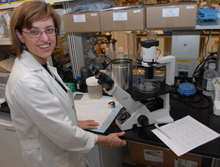Research over the last decade has shown that vitamin D has wide-ranging, beneficial effects, from improving bone health to reducing cardiovascular disease. But too much can also be toxic, especially for children.

Dr. Maria Vogiatzi Credit: Patricia Kuharic
"Although vitamin D toxicity is very rare, intoxication still happens in children," said Dr. Maria Vogiatzi, an associate professor of clinical pediatrics at Weill Cornell Medical College. "Many children receive high doses of vitamin D supplementation, either over the counter or by prescription. However, we have little information about the long-term safety of high vitamin D doses in pediatric patients."
Dr. Vogiatzi published a review of all studies on vitamin D supplements and the risk of toxicity for children in the Journal of Clinical Endocrinology & Metabolism on Jan. 23.
Most children should receive between 400 and 600 IU of vitamin D daily, though children at risk for deficiency may take as much as 4000 IU daily. However, over-the-counter vitamin D preparations often have different concentrations, Dr. Vogiatzi said, and parents should check the concentrations before switching.
Dr. Vogiatzi also suggested that pediatricians may want to check serum vitamin D concentrations in children treated with high doses of vitamin D for prolonged periods of time. They should also be familiar with the signs and symptoms of vitamin D intoxication, which include poor appetite, weight loss, abdominal pain, vomiting, and constipation, so that they are able to screen and treat their patients appropriately.
After reviewing all of the published literature on vitamin D toxicity in children, Dr. Vogiatzi said more research on the benefits and long-term safety of vitamin D in children is needed, particularly in infants. She also said that better understanding of the genetic factors that affect how vitamin D is absorbed by the body may allow doctors to tailor vitamin D supplements to an individual patient's needs.

